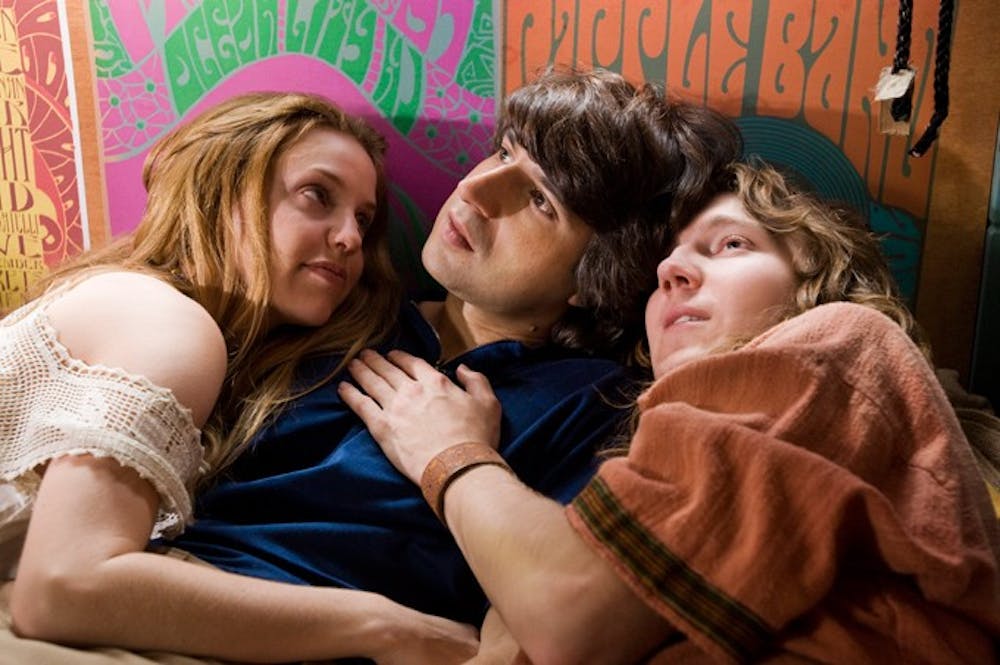Grade: C+
If you're curious or open-minded enough to think maybe there was more to the hippie movement of the 1960s than just drugs and free love, seeing Ang Lee's "Taking Woodstock," a dramatization of the concert attended by half a million young people in 1969, won't provide much further education on the matter.
The movie doesn't portray the movement as much of anything beyond several well-mannered, easygoing, perpetually stoned teens and 20-somethings out to have a good time, giving no depth to the pivotal social movement. But then again, it doesn't really try to; far from being a powerful drama or a true comedy, "Taking Woodstock" utilizes the same feel-good attitude as its subjects, providing some amusement but also turning to fluff because of it.
The film starts off with the story of Elliot Teichberg (Demetri Martin), a young man torn between two generations, while he starts off living in New York City. As a painter and interior designer, his loyalty to his parents -- and lack of money -- compel him to move back to their failing motel in the Catskills to try to help them through their financial difficulties. When he learns that the Woodstock Festival has been kicked out of a neighboring town, he manages to get Michael Lang (Jonathan Groff) and the rest of the festival's organizers to come to his town, hoping for an infusion of business.
There's no question that "Taking Woodstock" is, at its best, a feel-good movie. Once Lang and his company show up and lease a farm from the charming Max Yasgur (Eugene Levy), they instantly solve Elliot's problems by booking the entire motel and paying his family to sell tickets. Groff and his fellow enterprising hippies come off as endearing, enlightened and all-around hip, relieving the built-up tension with a lasting sense that everything will work out (as it inevitably did in real life).
Vietnam rears its head at several points in the film, both through various overheard television broadcasts and the character of Billy (Emile Hirsch), Elliot's best friend who suffers from borderline comical post-traumatic stress disorder after returning from the war. While various media entities chastise the hippies for flocking to Woodstock to enjoy themselves while young men die in Vietnam, Billy finds himself liberated by the movement, as it allows him to release his inhibitions and escape from the war that shattered his childhood.
Freedom, both mental and physical, is the driving force behind Woodstock, as Elliot states quite plainly in the funniest stoner scene of the movie. Elliot finds his true self in a haze of marijuana and acid, resolving to leave home and embrace his homosexuality. Martin acts a bit more uptight than one would expect from a comedian of his ability, but it provides the perfect counter to Groff and the rest of the hippies. It would also be remiss not to mention Liev Schreiber as Vilma, a cross-dressing Marine sergeant, whose deep voice and coy smile defy most drag queen stereotypes.
"Taking Woodstock" succeeds visually thanks to its use of split screen in homage to the documentary "Woodstock," featuring a particularly creative acid trip and scenes with hundreds of people that convey a sense of just how large the event was. The farm and the region around it are shot with great detail to show natural beauty overcoming dilapidation and economic hardship.
But the most inexcusable issue with "Taking Woodstock" is the near total lack of any music from Woodstock. Aside from a couple echoes of Ritchie Havens and Joan Baez in the distance, none of the Woodstock performances, reenacted or otherwise, are present in the movie, and the lackluster soundtrack isn't memorable enough to cover it up. Elliot is sidetracked at every attempt to go see the concert, whether by natural forces or an acid trip, and as a result, we never see anything beyond fields of peaceful hippies.
While "Taking Woodstock" is enjoyable most of the time, anyone actually interested in the music or seeing a movie as revolutionary as the event itself will be quite disappointed.
You can reach this writer at thescene@theeagleonline.com.





